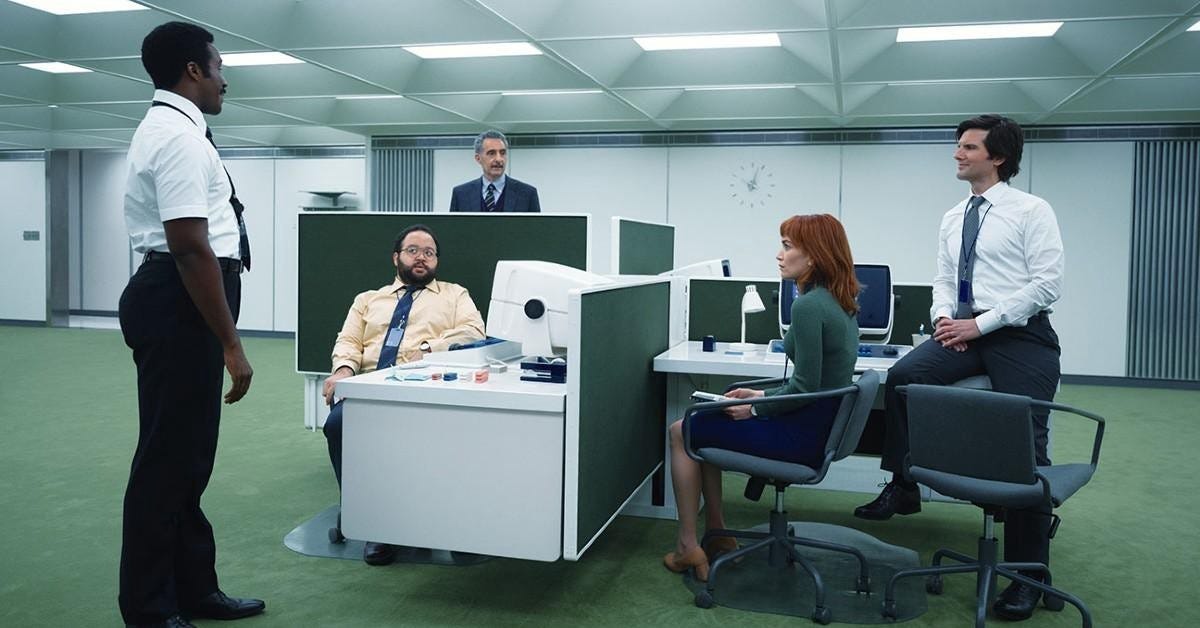The Relevance of Severance
Six weeks into season 2, Severance is proving once again to be an especially relatable critique of the modern office job, while providing a fascinating puzzle to solve.

(WARNING: Some Spoilers lie ahead)
When Severance exploded onto our screens in February 2022, it served as a depressingly relatable satire of professional working life. We followed Mark S, Irving B, Dylan G and their new recruit, Helly R, as they completed eight hours of mysterious, monotonous work for a company called Lumon.
God that sounds dull, why would you want to come home from eight hours in the office to watch a show about eight hours in the office? Well, there’s a catch. The Macrodata Refinement team are “severed” employees, meaning their consciousnesses only exist within the walls of the Lumon offices. When each of them arrives at work each day and enters the lift, they phase from their “outie” (original) consciousness to their “innie”, who has been created purely to work for Lumon each day.
They’re told the work they do is “mysterious and important” without any clear indicator of what it actually is. If they perform well, they’re rewarded with office perks such as a “Defiant Jazz” experience or a “Waffle party”, while if they underperform they can be sent to the “Break Room” where they’re forced to recite text about how sorry they are for their misdemeanours. They’re introduced to Lumon’s history, with its founder, Keir Egan, portrayed as a Messianic figure. A cult-like dedication to Keir and the whole Egan family is expected.
The show really resonated with its audience as it is all too relevant to so many office jobs of today. In the recruitment stage, applicants are told of the perks of the job, the pool table, stocked kitchen and socials. Then, upon joining, they are inundated with details about the company’s culture and founder. Perhaps well-meaning, this so often misses the mark that those starting an entry level role are unlikely to feel a connection to a big corporation’s history no matter how hard they try. Why should they care about a grand vision when they are so disconnected from any meaningful decisions?
Once in the job, there might be vouchers or a later start time offered as incentives for hitting targets (can speak from experience on this one), while regular performance reviews look to constantly fix any drop in productivity and optimise output.
Severance’s social commentary is supplemented with an intriguing plot about what Lumon is actually doing and season one ended on a tantalising cliffhanger as our “innie” heroes briefly took over their bodies in the outside world and learned about who they are outside of the workplace. It took three years to get the highly anticipated season two, but boy has it been worth it so far.
After the events of season one’s finale, a company video tells MDR that Lumon has listened to its workers’ concerns and adapted its working practices to be more accommodating of its employees. MDR’s coup is portrayed as a positive learning experience for the company, opening its eyes to the issues of their working conditions.
Of course, the changes are superficial. New company perks such as “Pineapple-bobbing”, additional snacks and hall passes are expounded as evidence of this supposed change in culture. While on the outside, Lumon presents itself as having accounted for those responsible for the finale’s events. MDR’s supervisor, Mr Milcheck, assures “outie” Mark and his sister, Devon, that the department’s boss, Ms. Cobel, was at fault for any malpractice and has been dealt with. In reality, she is offered a different position while the equally culpable Mr. Milcheck is promoted to hers and everyone else remains untouched.
Clearly, Lumon is too big to fail and represents real-life megabusiness which, when faced with scandal, might reshuffle some employees and produce some mumbo jumbo about a ‘change in culture’, but ultimately escape without accountability. The board remains a faceless entity who Lumon employees never hear speak, their thoughts instead communicated via a PR intermediary.
Just over halfway through season two, the plot has become ever more intriguing (just what are the baby goats all about?), while continuing to comment on the lack of meaning found in office work for many and the shallow ways businesses try to create a sense of purpose. In episode four, MDR are treated to Lumon’s first ever “ORTBO,” which stands for Outdoor Retreat and Team Building Occurrence, allowing them to experience the outside world for the first time as part of a morale building activity. This succinctly sums up Lumon’s empty culture.
The show’s creator, Dan Erickson, has spoken about how he conceived of the idea of Severance while working a 9-5 in a door factory. Erickson found the work monotonous and meaningless which contributed to a period of depression. He wished he could effectively fast forward his eight hours at the office each day, which led to the notion of “severance”.
It is for this reason that Severance feels so relatable. At its heart it's drawn from the real experiences of the repetitive grind of many 9-5s, which has been fleshed out with the sci-fi elements of the severance procedure and the mystery of Lumon’s project. It continues to be one of the best shows on TV: expertly cast, beautifully shot and superbly written.
0 Comments Add a Comment?